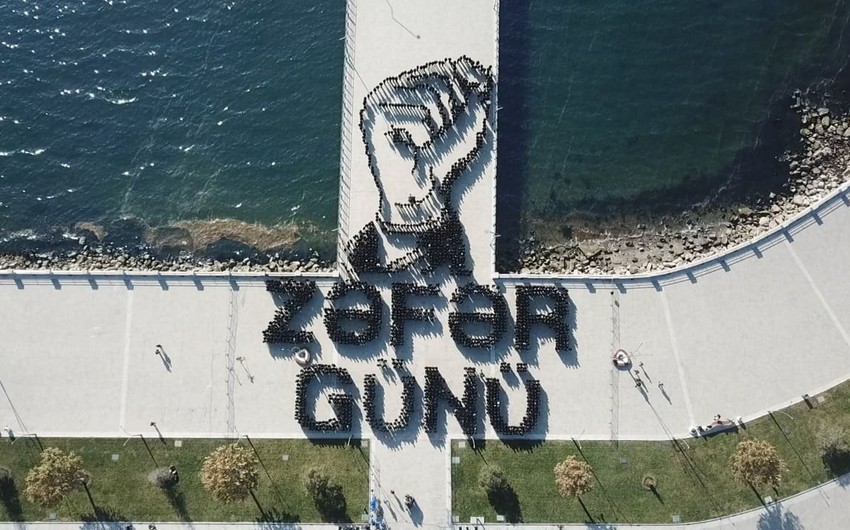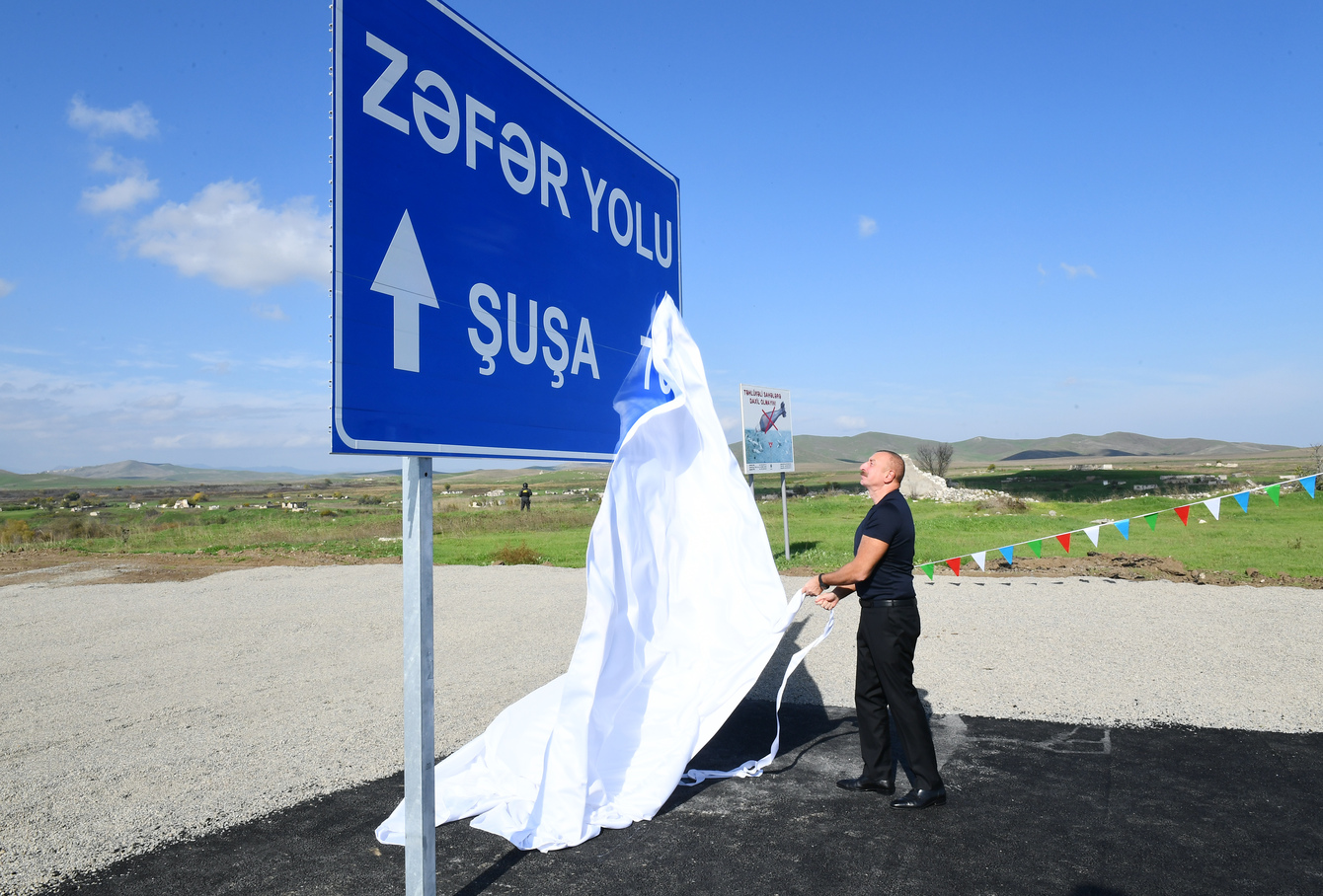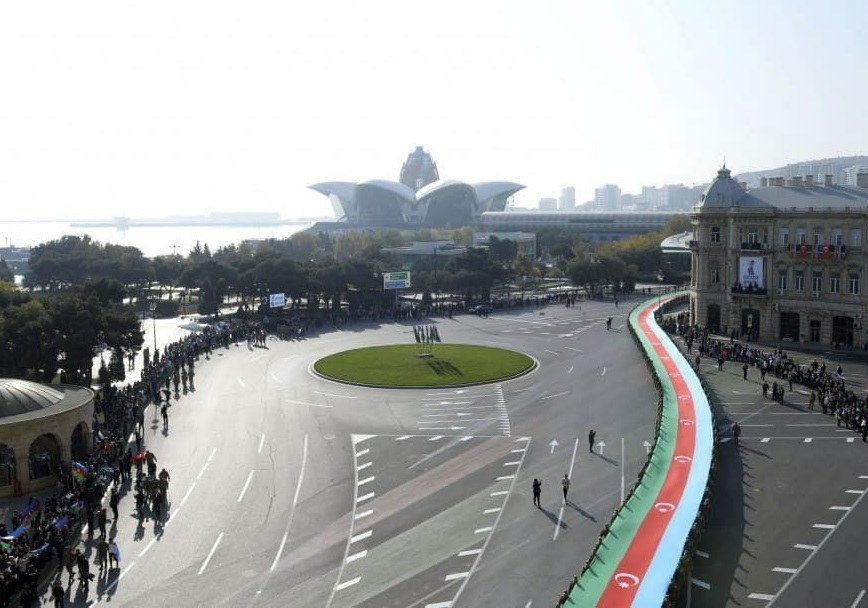Azerbaijan, the South Caucasus’ largest country of over 10 million people, celebrates today the first anniversary of the historic victory on November 8, 2020, ending the war in the country's Karabakh (Garabagh) region.
One year ago on this day, the Azerbaijani forces liberated the strategic Shusha city in the Karabakh region from a decades-long Armenian occupation. The city’s salvation was seen as the pinnacle of the Azerbaijani army’s weeks-long counter-attack operations, codenamed “Iron Fist.”
“Dear Shusha, you are free! Dear Shusha, we are back! Dear Shusha, we will reinvigorate you!” said President Ilham Aliyev on November 8, 2020, referring to the liberation of the Shusha city by Azerbaijani army.
Shusha was said to be one of the major strongholds of the Armenian occupying forces, who could not resist face-to-face battles with the Azerbaijani troops and retreated in disarray. Liberation of the city has had a crucial impact on the surrender of Armenia's forces and signing a ceasefire statement on November 9, 2020.
On December 3, 2020, President Ilham Aliyev signed an order establishing November 8 as “Victory Day” in Azerbaijan.
“Victory Day is our holiday. It is the holiday of Victory, it is the holiday of courage, it is the holiday of justice, it is the holiday of national pride, it is the holiday of national dignity. We have restored our dignity. From now on, we will live forever as a victorious country and a victorious nation,” President Aliyev said in a meeting with the Azerbaijani servicemen in Shusha on Monday, President.Az reports.
The first anniversary of Victory Day on Monday started with a solemn march of the personnel of the Azerbaijani army carrying a huge flag of the country along the major avenue on the Seaside Boulevard in capital Baku. Various events, including flash mobs, concerts, and a grandiose firework have been held commemorating the historic victory.

President Ilham Aliyev traveled to Shusha, the cultural capital of Azerbaijan, to inaugurate and lay the first stone for multiple projects as part of the ongoing restoration and reconstruction campaign in the city. He attended inauguration of the all-new highway, the Victory Road, leading from the Fuzuli district to the city of Shusha. The highway spans 101 kilometers traversing the liberated territories of the Fuzuli, Khojavand, Khojaly and Shusha districts.
President Aliyev also laid the foundation stones for the Shusha District Central Hospital, the Shusha Radio and Television Broadcasting Station, the Dashalti Mosque, and viewed restoration works in Ashaghi Govhar Agha Mosque and at the Estate Complex of the Mehmandarovs, one of the most famous dynasties of Shusha. Both the mosque and estate complex have been subjected to serious vandalistic acts by Armenians during the years of occupation.

Armenia and Azerbaijan had been in an armed conflict for nearly 30 years over the Karabakh (Garabagh) region, which is an internationally recognized territory of Azerbaijan. Armenia launched a full-blown military aggression against Azerbaijan following the Soviet Union’s dissolution in 1991. The bloody war lasted until a ceasefire in 1994 and saw Armenia occupying 20 percent of Azerbaijan’s internationally recognized territories. Over 30,000 Azerbaijanis were killed, and one million were expelled from those lands in a brutal ethnic cleansing policy conducted by Armenia. Although the United Nations Security Council adopted four resolutions in 1993 demanding the immediate withdrawal of the occupying forces from Azerbaijani lands and the return of internally displaced Azerbaijanis to their ancestral lands, Armenia failed to comply with all four legally binding documents.
Armenia occupied Shusha on May 8, 1992. The city underwent an unforeseen policy of destruction by Armenians aimed at erasing Azerbaijan’s historical and cultural heritage. Shortly before the last year’s war, the illegal separatist regime established in the occupied Azerbaijani lands held a self-designed bogus “presidential inauguration” in the city.
President Aliyev said the provocative steps of Armenia, such as claiming the Karabakh region as part of Armenia, have irreversibly derailed the decades-long peace negotiations between Armenia and Azerbaijan.
“By saying 'Karabakh is Armenia', Armenia not only put an end to the process of negotiations but also insulted us. It was an insult addressed to us when a fake swearing-in ceremony was held in Shusha, the crown of Karabakh, which is so sacred to us. The relocation of the so-called “parliament” of the self-styled entity to Shusha was another provocation against us. Armenia was arrogantly threatening us with renewed occupation. How much longer did we have to put up with that? Someone had to teach them a lesson, didn’t they?” President Aliyev said, adding that brave Azerbaijani servicemen sacrificed their lives to liberate Shusha and other lands of Azerbaijan from Armenia.
On September 27, 2020, the decades-old conflict took a violent turn after Armenia’s forces deployed in the occupied Azerbaijani lands shelled military positions and civilian settlements of Azerbaijan. During the counter-attack operations that lasted 44 days, Azerbaijani forces liberated over 300 settlements, including the cities of Jabrayil, Fuzuli, Zangilan, Gubadli, and Shusha, from nearly 30-year-long illegal Armenian occupation. The war ended in a tripartite statement signed on November 9 by Armenia, Azerbaijan and Russia. Under the statement, Armenia also returned the occupied Aghdam, Kalbajar, and Lachin districts to Azerbaijan.
The Azerbaijani army restored Azerbaijan’s sovereignty over Shusha on November 8, 2020, during the final days of the 44-day war, which took place between September 27 and November 9, 2020.
Shusha is a key city in the Karabakh region due to its geographical location and historical significance as one of the major cultural, economic, and administrative centers of Azerbaijan. The city is located approximately ten kilometers from Khankendi, the region's largest city.
Shusha was built during the reign of the Azerbaijani Karabakh khanate's Panahali khan in the 18th century. According to the historical sources, Panahali khan decided to build an "eternal and invincible fortress in a firm and impassable place in the mountains" given the unfavorable location of the previous castles. Construction of the city kicked off in 1752 at about 1,600 meters above sea level in Karabakh and the capital of the khanate was moved to the city in 1756-1757.
Shusha has long been one of the main administrative, economic and cultural centers of Azerbaijan since its establishment by indigenous Azerbaijanis. The city has played a key role in the development of Azerbaijan's carpet weaving industry. Shusha was the Karabakh region's carpet-weaving center in the second half of the 19th century and carpets produced in Shusha have been exported to global markets in the late years of the same century. The ornamental and plot groups of Shusha carpets defined the mainline trend in local carpet-weaving. Shusha’s carpet-weavers, Meshedi Bayram Gurban-oglu, Djabbar Haji Akber-oglu, Fatima Aga Sherif-gizi, Ahmed Dashdamir-oglu took part and won awards in an international show in Paris in 1867. Shusha carpets also received prizes in 1872 in Moscow Polytechnic Exhibition.
At the end of the 18th century, Shusha became one of the important trade centers in the entire South Caucasus region. Merchants brought to Shusha various goods from other Azerbaijani cities such as Baku, Sheki, Nakhchivan and Ganja. The cities of the Ottoman Empire, Russia, Iran, India and European countries played an important role in Shusha's trade relations. Merchants from Shusha were regular participants of the famous fairs in Leipzig, Germany, and Nizhny Novgorod, Russia.
Shusha is to Azerbaijan what Vienna is to Austria and Naples is to Italy in terms of music. The city is well known as "the temple of Azerbaijani music" and the conservatory of the South Caucasus. The founding father of Azerbaijani composed classical music and opera, Uzeyir Hajibeyli was born in Shusha, a city also home to world-famous Azerbaijani poet Molla Panah Vagif and poetess Khurshudbanu Natavan.







 The number of evacuees from flooded areas in Kazakhstan has reached 97,852 people, including about 32,856 children since March 27.
The number of evacuees from flooded areas in Kazakhstan has reached 97,852 people, including about 32,856 children since March 27.
 The Islamic holy month of fasting, Ramadan comes to an end this week with the celebration of a joyous festival called Eid (meaning “festival” in Ar...
The Islamic holy month of fasting, Ramadan comes to an end this week with the celebration of a joyous festival called Eid (meaning “festival” in Ar...
 Iran's senior military leaders described the drone and missile attack on Israel on April 14 night as “successful".
Iran's senior military leaders described the drone and missile attack on Israel on April 14 night as “successful".
 Iranian President Ebrahim Raisi warned Israel that it would face a "real and extensive" response if it makes any "mistake" following Tehran’s missi...
Iranian President Ebrahim Raisi warned Israel that it would face a "real and extensive" response if it makes any "mistake" following Tehran’s missi...



